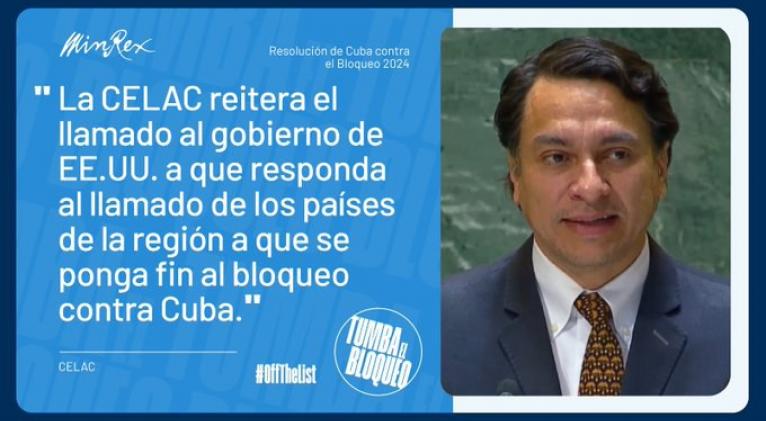The U.S. Must Listen to the World and End the Blockade Against Cuba: CELAC
especiales

For more than 60 years, the U.S. foreing policy has caused significant damage to the well-being of the Cuban people.
On Tuesday, the United Nations General Assembly (UNGA) opened the first debate session on the draft resolution entitled “Necessity of Ending the Economic, Commercial, and Financial Blockade Imposed by the U.S. Against Cuba.”
RELATED:
New York Streets Become a Stage for Cuban Resilience: An Artistic Tribute Amidst the U.S. Blockade
The representative of Honduras, the country currently holding the pro tempore presidency of the Community of Latin American and Caribbean States (CELAC), spoke in favor of lifting the blockade.
“In 2015, CELAC member states welcomed the measures taken between Cuba and the United States to begin normalizing diplomatic relations,” the Honduran diplomat said, emphasizing that these measures marked a new chapter in the history of peace and peaceful coexistence among American nations.
However, “CELAC regrets that the blockade is still a reality for Cuba,” he said, adding that the Community believes the blockade is the main obstacle to Cuba’s normal development.
The Honduran representation confirmed that the report presented to the UN outlines the costs this policy imposes on the Caribbean country, which “causes significant harm to the well-being of the Cuban people and is contrary to the Latin American peoples’ aspirations for peace as expressed in the Proclamation of Latin America and the Caribbean as a Zone of Peace.”
“The U.S. blockade is also contrary to the letter, spirit, purpose, and principles of the United Nations Charter and International Law,” the Honduran representative affirmed
“The CELAC states reiterate their opposition to the application of laws and measures contrary to International Law, such as the Helms-Burton Act, including its extraterritorial effects,” he added.
Similarly, CELAC expressed its disagreement with Cuba’s designation as a “State Sponsor of Terrorism,” which “is unfounded and has reinforced the intimidating effect of restrictions associated with the blockade, undermining Cuba’s ability to establish trade and financial relations with international partners.”
“The UN Charter establishes rights, obligations, and principles that no member should contravene or undermine. States must act in accordance with this document,” the representative of Honduras said, reiterating that the U.S. must respond to the call of the world and its own people to end the blockade.














Add new comment